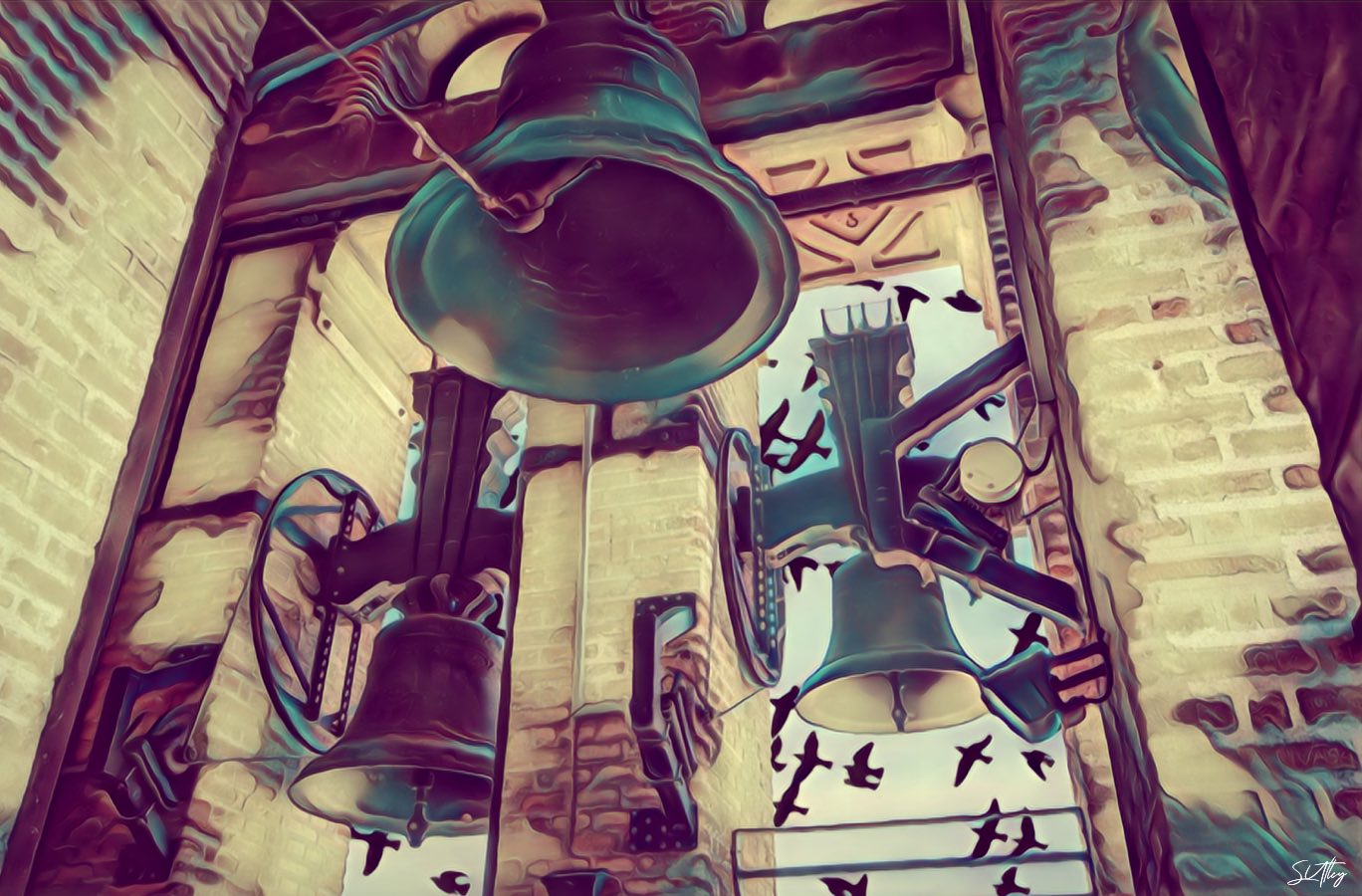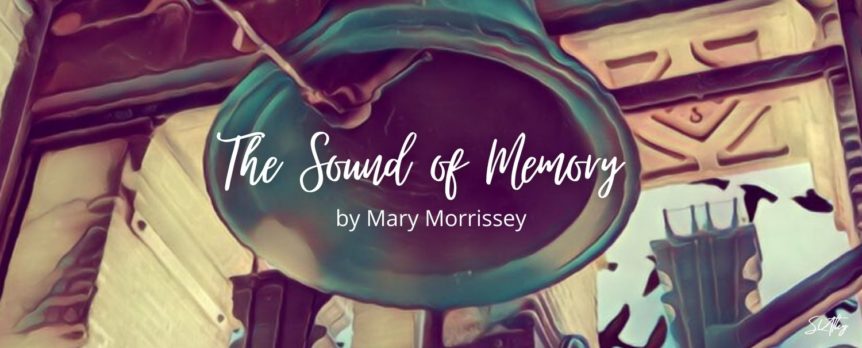The Sound of Memory
by Mary Morrissey
I remember the church bells and how their reverberations rattled my organs inside of their cage of bone and flesh. The hum of the chimes made my hair stand on end and caused raised bumps to form on the outermost layer of my skin. They made me grit my teeth in discomfort while my brain simultaneously released endorphins into my soul. A tad dramatic I know, but sound has always been the sensory heartbeat in my life. Whether it be music, the chime of a church bell, the ticking of a clock, the ringing of a doorbell, or the riotous laughter of my lover and children, the sounds that echo through my memories are all I have left now.
I wish I could say that all the sounds encased in the lighted recesses of my mind are ones of immense joy, but at the end of every aisle of compartmentalized emotion is a shelf whose light will never shine again. During moments of reminiscence, the light flickers. I hear the electricity snap and hum, struggling to relight, but I can never bring myself to turn it on again. Confronting the quiet of those darkest moments is something I am not sure I will ever be able to face. I've heard the crunch of fallen leaves freeze into the hush of falling snow then melt into slapping droplets of rain for three cycles now, and still, I feel no closer to being able to look into that terrible darkness.
On nights like tonight, I wake drenched in sweat from visions of amber-glowing lights wrapped around crackling wood panels. As I lay here, I swear I feel the heat rising around me and smell the smoke. The creak of a door draws my eyes over to a light growing with aching slowness. A head of pearl-white hair, floating as if disembodied, casts a shadow around the door's edge.
"Are you alright, Dear?" she says. "I heard you screaming again."
"Yes, Mom," I reply. "Sorry to worry you."
She nods, then the light shrinks, the floating head disappears from view, and I listen to the hinges groan angrily before the click of the door handle introduces a dome of silence above me; this has become a near-weekly occurrence.
I tell her often that this is temporary and I'll move out as soon as the house gets rebuilt. She nods; I suppose trying to encourage me, but we both know it's been three years, and I haven't had the courage nor desire to speak with a contractor. She won't push me; maybe she needs me as much as I need her. Her loss was far less a tragedy than a consequence of time, but a widow is a widow, so we can, at the very least, sit in sadness together.
This morning starts like all others. I sit around the kitchen island; my unblinking eyes lock onto a black speck within the gray granite countertop. I sip coffee from a mug that reads Best Mom Ever, even though I'm not even sure I get to call myself that anymore. My mom sits in front of me, flipping through the local tribune. Something about the rustling of the pages brings me both comfort and shame.
He was reading the paper that morning. Our children were giggling as they chased each other around our kitchen. He flipped to the next page, then one of the corners flopped down so that I could see his eyes. He looked up at me as I sipped my coffee and winked. I giggled as I took another sip and the tops of his cheeks rose, causing little folds of skin to form on either side of his eyes. I remember wanting to reach out and trace the lines on his face.
Looking back now, I wish I had. Somewhere inside, I know it would have made no difference. He had already made up his mind, but when trying to make sense of something that can never make sense, as humans, we always come up with ways we could have done something different. Our brains are in a constant state of answering what-ifs. What if I took a little longer to get ready for work that morning, or what if I had kissed him a little deeper, or hugged my children for just a single second more; then maybe they would still be here.
The sight of the coffee in my hand now sends my stomach reeling, so I stand from the kitchen island and walk over to the sink; I soak in the satisfying glug as the last drop escapes down the drain. I leave the mug in the sink and make my way back upstairs to my not-so-temporary temporary room. A small desk sits in front of a window across from the bed; I drag the chair slowly back, reveling in the glorious sound of wood scraping against wood, celebrating how it sets my teeth on edge. These days I enjoy the sounds that bring me discomfort because even one moment of happiness feels like a betrayal of the truth.
A soft knock on the door behind me, followed by my mother's muffled requests to come down for dinner, tells me that I must have been sitting for quite some time at that desk staring out the window. I make my way to the stairs and begin my descent. The creak of my feet connecting with each wooden board brings up memories of nights before Christmas when my father would dress as Santa and put the presents under the tree.
He was never a light-footed man, and the old house enjoyed ruining the element of surprise with its loud groaning, but on those nights, he wore bells on his feet to make sure we heard. His commitment to selling the charade was admirable, but by the age of six, I had figured out it was him. When he became a grandpa, he had the chance to do it all over again. I remember the hushed tones through the guest room wall from my children exclaiming that Santa had arrived. They would creep down the upstairs hall like a bowling ball in a china shop just to get a glimpse of the red hat and jingling boots.
I sit down on the bottom step now as a lump forms in my throat and tears sting the edges of my eyelids. My mother finds me here after a few moments, curled up at the bottom of the stairs, heaving breaths threatening to pop my lungs like balloons. She picks me up, half carrying and half supporting me as we walk to the table.
"I know it's hard, Darling, but you have to eat," she says.
I pick up the fork and find that the only way I can stomach anything is to grate my teeth against the metal prongs each time I take a bite, making it as uncomfortable as possible. My mother says nothing, likely just happy that I am eating something—no matter how destructively I have to do so. I manage to finish most of my plate before excusing myself back to sit at the desk and stare out the window.
I hear the ring of a children's bicycle bell and am reminded of the last time my husband taught our children anything. It was my youngest's turn to learn how to ride a bike with no training wheels. My husband had one hand on the back of the seat and the other on one of the handlebars running alongside the bike. His legs were flailing behind him, and his back bent at an awkward angle. I remember grinning at the sight of him. Our youngest chimed the little bell on his handlebars, unable to contain his excitement.
"Daddy, you look silly," he giggled.
"You have to focus, Bud," he replied. "Keep both hands on the handlebars and don't stop peddling. When you're ready, I'm going to let go. Okay?"
"Okay. I'm ready. You can let go now."
My husband released him, and as he did, the momentum got the better of him. He fell to the pavement while our son screamed with excitement that he was staying up. My husband never once let his eyes leave our son. Little rocks dug into the raw and bleeding palms of his hands and knees, and despite the pain, he still kept watching.
"You are doing so great, Bud! I am so proud of you!"
That was two weeks before it happened. I keep trying to piece together all the moments that led up to that day to understand how he could have gone from a proud father to what he became, but there were no warning signs. I pull out a notepad on which I've created a timeline of events over the two weeks leading up to that day; on the final page taped inside is the note he kept in his pocket to be found by police later.
To whoever happens to find this, I need you to know that this wasn't an accident. I ran our car into this tree with the intention of killing us after setting our house on fire. To my wife, I will always love you, and I'm sorry we had to leave, but God told me he wanted us to come home, and you couldn't come with us.
I have sat at this desk every day trying to make it all make sense. Searching for that moment I had to have missed when I could have saved them, but there is nothing but ordinary moments in an ordinary life. The chime of a bicycle bell, the creak of a floorboard, the sipping of coffee, the rustling of a newspaper, all of it just…normal.
I slam my fists on the desk and cry out. My mother bursts through the door and wraps her arms around me trying to settle my now-shaking body.
"It's not your fault, Baby," she says. "There is nothing you could have known or done to stop this."
I try to find my voice, but it remains silent beneath my tears' attempts to drown me. After several moments I manage to come up for air.
"If it's not my fault, then who is to blame?" I ask. "Should I blame him? I want to blame him, but can I even do that?"
My mother releases me, and I turn around to face her. "He was sick, Honey. He was sick, and none of us knew it. Not even he knew it. I wanted to blame him too. My grandbabies are gone, and that is a pain I'll never comprehend, but sometimes a tragedy is just a tragedy. It's no one's fault."
She leaves me alone, and I walk over to lay down on the bed. Tonight, I dream of glass shattering and the horrifying crunch of a car hitting a tree.
I wake and open my eyes. I let the brightness of the sun burn them for a few seconds before blinking the tears away. I go downstairs to sit in the kitchen as I always do, but I manage to finish my coffee this time. I decide to put on real clothes—instead of the robe that I have been living in for months. I get in my car and start driving. I am not sure where I'm headed until I arrive beneath the church and park my car in front of my office across the street. The screech of tires startles me. For a moment, I stop breathing. Did he break at all that day, or did the engine rev until the crunch of metal and explosion of glass brought the car to its final stop? The church bells above me chime, and their once beautiful sound is now a reminder of the worst day of my life.
I remember laughing with a coworker about some crazy customer who wanted the world on a silver platter. The first bell I heard was the ringing of our doorbell. My coworker answered then called me over to where two police officers stood. I can't remember if they said anything and, in my memory, there was silence as they handed me the note my husband had written. It was as if the entire world had stopped breathing at that moment. As soon as I read the last words, I heard the gong of the church bells echoing around me. I somewhat recall one of the officers offering his condolences, but all I could hear were the church bells banging over and over, reminding me that I was still at work, this was real, and it wasn't some horrible nightmare that I was about to wake from.
For days after, all I could hear were those bells and now, standing here beneath them, hearing them chime for the first time since it happened, all I can do is cry. He was sick, nobody knew, not even he knew, and it was a tragedy with no one to blame.


ABOUT THE AUTHOR
Mary Morrissey is a born and raised Pacific Northwest writer currently living in Albany, NY. Her writing journey began at the ripe old age of eight years old when she wrote a story about a dinosaur whose only hope in life was to become a ballerina, and despite the haters, she never stopped dancing. While the subject matter of her writing has matured, her passion for exploring human experiences has remained strong.
Share this Post


Comments
Powerfully written! The detail is exquisite! I feel the loss, the anger, the emotional dischord in it all! There is a lesson here, but it is difficult to recognize because the emotion is depicted in such a potent way! I love this piece!!
Awesome writing Mary! Keep going. 😃
Grief is the villain in this story. Mary, you nailed the darkness that surrounds a grieving person. Well done!
Powerful story dealing with grief. My thoughts: Suicide is complex. No one takes their life for a single reason. There are warning signs but we as a society are not trained to see them and deal with them adequately. The military in particular is struggling immensely with this. We go thru sooo many trainings and seminars yet our rates are rising. Theres something fundamentally missing in American societies approach to suicide.